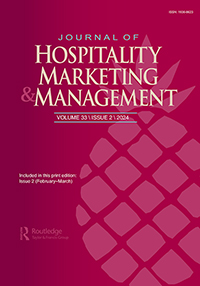The mechanism of value cocreation in robotic services: customer inspiration from robotic service novelty
IF 11.9
1区 管理学
Q1 BUSINESS
Journal of Hospitality Marketing & Management
Pub Date : 2022-08-17
DOI:10.1080/19368623.2022.2112354
引用次数: 11
Abstract
ABSTRACT Service robots provide operational benefits to restaurants, but the mechanism through which novel robotic services optimize customer experience given appropriate robots’ dependence on human employees remains unclear. To fill this gap, this study adopts the transmission model of customer inspiration and identifies customer value cocreation processes in robotic services. Combined evidence from two online experiments and a field experiment demonstrates that robotic service novelty has a positive effect on customer cocreation intention via customer inspiration. Robotic task interdependence, which reflects the extent to which a robot relies on human employees to complete its tasks, attenuates the relationship between robotic service novelty and customer cocreation intention through decreased customer inspiration. These findings offer insights into marketing strategies for robotic services that provide enhanced customer experiences.机器人服务的价值共创机制——来自机器人服务创新的客户启示
摘要服务机器人为餐厅提供运营效益,但考虑到合适的机器人对人类员工的依赖,新型机器人服务优化客户体验的机制尚不清楚。为了填补这一空白,本研究采用了客户灵感的传递模型,并确定了机器人服务中的客户价值共创过程。来自两个在线实验和一个现场实验的综合证据表明,机器人服务的新颖性通过客户灵感对客户的共同创造意图产生了积极影响。机器人任务的相互依赖性反映了机器人在多大程度上依赖人类员工来完成任务,通过减少客户灵感来削弱机器人服务新颖性与客户共同创造意图之间的关系。这些发现为提供增强客户体验的机器人服务的营销策略提供了见解。
本文章由计算机程序翻译,如有差异,请以英文原文为准。
求助全文
约1分钟内获得全文
求助全文
来源期刊
CiteScore
20.90
自引率
6.40%
发文量
33
期刊介绍:
The Journal of Hospitality Marketing & Management serves as a peer-reviewed platform dedicated to advancing understanding, practice, and education in hospitality marketing and management. It strives to foster the development of knowledge and theory by promoting new ideas, models, approaches, and paradigms. Embracing a multifaceted approach that spans administrative disciplines, liberal arts, and social sciences, the journal disseminates knowledge through high-quality, peer-reviewed research papers, reports, and book reviews. It stands as a unique forum for the community of students, academics, and practitioners who share a common interest and commitment to the field of hospitality marketing and management.

 求助内容:
求助内容: 应助结果提醒方式:
应助结果提醒方式:


